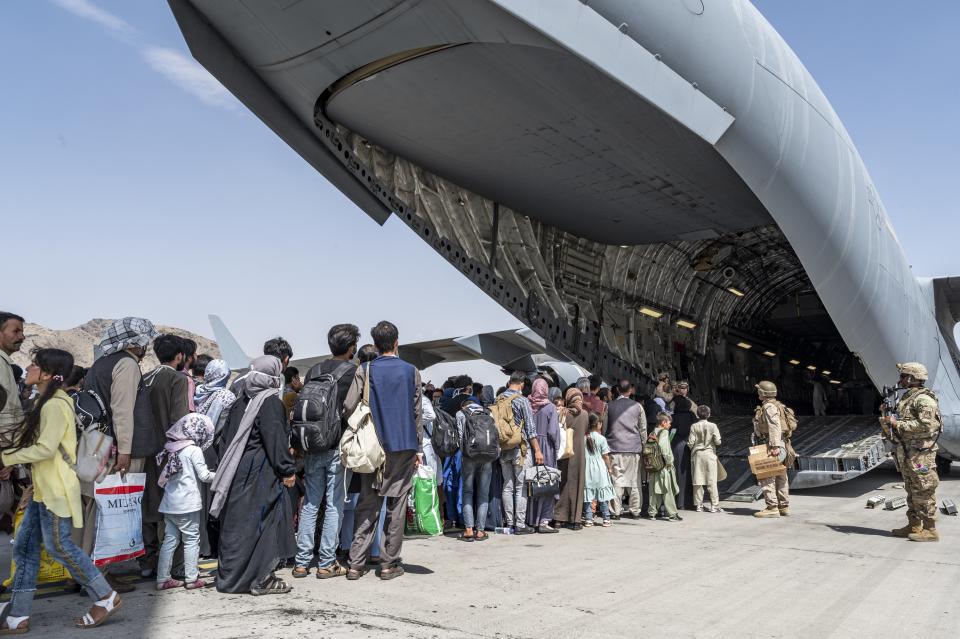U.S. veterans revive long-dormant escape networks to save Afghan interpreters
The distress call came in over WhatsApp the same day that Kabul fell to the Taliban.
“’Gunny,’” the voice from far away said, according to the recently retired Marine who received the call Aug. 15. “I need help. The Taliban are trying to hunt me.”
The caller was an Afghan who served as an interpreter with his unit a decade ago, the retired Marine, who held the rank of gunnery sergeant at the time, told NBC News.
“We became friends and stayed in touch after I left Afghanistan,” he said. NBC News is not identifying the retired Marine, who lives in California, to prevent the Taliban from connecting him to the interpreter. “He said he was already getting death threats and he was worried about his family.”
Immediately, he said, “I kicked into overdrive and started calling other members of my unit” and quickly discovered they had heard from three other terrified “terps” who were also in danger.
“We formed a group and started asking ourselves, ‘Who do we know on the ground in Kabul who could help us? How do we get the four "terps" and their families to the gates” of the Hamid Karzai International Airport, he said.
Such veterans groups have popped up across the country since the shocking Taliban takeover two weeks ago.
Operating individually or in association with others, the groups have been using the skills they honed in the military and the social media savvy they picked up as civilians to save their former Afghans interpreters and their families from the Taliban.
Responding at lightning speed to frantic SOS calls, they’ve been rapidly reviving long-dormant escape networks to get these vulnerable Afghans out of immediate danger, if not out of the country.
“We can’t leave them behind,” the retired Marine said.
Months before, when the Trump administration announced that it was pulling U.S. forces out of the country, the “No One Left Behind” nonprofit was already planning the escapes of thousands of Afghan interpreters.
The group, whose mission is “ensuring that America keeps its promise to our interpreters from Iraq and Afghanistan” was already helping Afghans fill out SIV (Special Immigrant Visa) applications, writing letters vouching for their service and bravery, and purchasing plane tickets to get them out of the country.
“That was our clarion call,” board member and Afghan War veteran Doug Livermore told The Wall Street Journal.
But the timetable fell apart when the Taliban took Kabul without firing a shot, and within hours the nonprofit was deluged with desperate calls and emails from terrified Afghans and their American friends looking for help.
In California, the retired Marine who spoke with NBC News said the “terps” his group was in touch with did not know one another.

So using Zoom and Facebook messenger, they had the Afghans rendezvous at the meeting spot in Kabul and then head together to the airport, he said. A dozen people showed up — the interpreters and their wives and children.
“We were following them on FaceTime as they tried to get to the gates of the airport,” he said. “We could see in real time the chaos, the kids getting gassed and trampled by the crowd, hear the gunshots.”
Five times, he said, they sent their group of Afghans to the airport and five times the group was turned away at the gates.
At one point, the retired Marine said, he had one of the Afghans show his cellphone to one of the Marines guarding the gates so he could plead directly with the guard.
“I was telling him, 'You’ve got to let them in, they’re our guys,'” he said. “But he said he had orders and he couldn’t. And I get that, Marines have to follow orders. But it was still disappointing.”
Meanwhile, the Afghans were losing heart. One of the interpreters had been nearly knocked out when he was hit in the head with a rifle butt. They all were tired and frustrated.
“We’re Marines and we’re so used to toughing it out, but the Afghans were breaking down,” he said. “You need to do this, we were telling them, otherwise you’re going to die.”
So back the group went to try a sixth time to get into the airport. And this time, one of the children in the group suffered a broken leg when the crowd suddenly surged and the child was trampled.
“They just pulled out and left and we did not hear from them for two, three hours,” the retired Marine said of the Afghan group. “I understand why they were angry. We were angry.”
The mission, at that point, then changed to finding the group a safe place to stay away from the Taliban's eyes. And that they were able to do.
“They’re safe for now, but they’re in limbo,” the retired Marine said. “I have already asked for a military escort to help them get back to the airport and get them past the gates. But now there are more Taliban checkpoints on the road to the airport and who knows if they’ll allow them through.”
"We're going to keep trying to get them out," he said.

